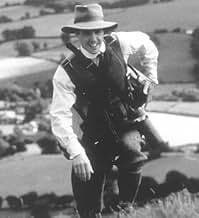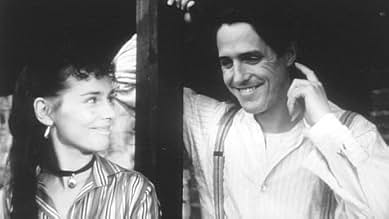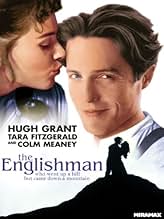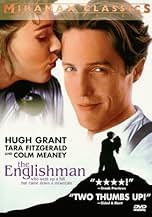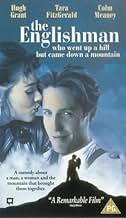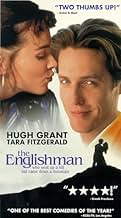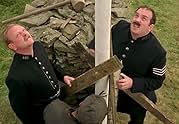IMDb रेटिंग
6.6/10
19 हज़ार
आपकी रेटिंग
अपनी भाषा में प्लॉट जोड़ेंWhen an English cartographer must tell a Welsh village that their mountain is only a hill, the offended community sets out to change that.When an English cartographer must tell a Welsh village that their mountain is only a hill, the offended community sets out to change that.When an English cartographer must tell a Welsh village that their mountain is only a hill, the offended community sets out to change that.
- निर्देशक
- लेखक
- स्टार
- पुरस्कार
- 1 जीत और कुल 1 नामांकन
फ़ीचर्ड समीक्षाएं
This was a very pleasant surprise, a nice movie with one of the simplest "plots" you'll ever see yet one that was fun to watch develop.
There are no nasty characters. They aren't all goody-goodies, either, but they're all interesting people to watch. The story is simply about a pair of cartographers (map makers) who measure a "hill" in Wales and much to the displeasure of the locals, it isn't tall enough to be considered a mountain, which is what the townsfolk always considered it. So, the locals work together to build it up so it will qualify to be officially labeled a mountain. Sounds simple and even stupid, but it isn't. Along the way, a romance buds between Hugh Grant and Tara Fitzgerald. There also is some nice cinematography in here.
Some might find it boring but I didn't. There was just something about this, a charm that made me feel good as I watched it and had me smiling even more by the end. This is a "sleeper," a movie you might pass up..... but don't.
There are no nasty characters. They aren't all goody-goodies, either, but they're all interesting people to watch. The story is simply about a pair of cartographers (map makers) who measure a "hill" in Wales and much to the displeasure of the locals, it isn't tall enough to be considered a mountain, which is what the townsfolk always considered it. So, the locals work together to build it up so it will qualify to be officially labeled a mountain. Sounds simple and even stupid, but it isn't. Along the way, a romance buds between Hugh Grant and Tara Fitzgerald. There also is some nice cinematography in here.
Some might find it boring but I didn't. There was just something about this, a charm that made me feel good as I watched it and had me smiling even more by the end. This is a "sleeper," a movie you might pass up..... but don't.
I know the area where this film was made and I have met many of the locals who's lives were affected by the film crews. People's windows were removed and replaced with older looking ones, some residents were sent on fully expensed holidays and telephone poles were taken down.
Most of the remarks I heard were quite negative, but at least the local pubs and hotels were full. Hugh and the other stars stayed at the Lake Vrnwy Hotel which is about 7 miles away from Llanraedr Ym Mochnant the village where the pub, garage etc were situated.
The pub in the movie wasn't a pub at all, but it is now. After the film crew packed up, the Hargest sign in the shop next door was left and is still there.
The police station was fake and is actually the village bus shelter which had a structure built around it.
The butchers is real and a very good butchers it is too. Run by Roger Evans for many years now, his wife played a small part in the film, she appears at the school and announces "we've come for the children".
The mountain which is shown in the film looming over the background of the village, is actually three miles away at Peny Bont Fawr. I've spent considerable time in the locality, staying at Peny Bont and I always called it Hugh Grant's mountain.
There are some very nice pubs in the area and the scenery is breath taking. If you are in Llanraedr, you can drive up to the Pystil Falls, the highest waterfall in Wales.
Go in late spring and the falls are at their fullest, following the melting of the mountain snows.
Incidentally, the pub that wasn't a pub is now a real pub and has been for about 4 years now.
Most of the remarks I heard were quite negative, but at least the local pubs and hotels were full. Hugh and the other stars stayed at the Lake Vrnwy Hotel which is about 7 miles away from Llanraedr Ym Mochnant the village where the pub, garage etc were situated.
The pub in the movie wasn't a pub at all, but it is now. After the film crew packed up, the Hargest sign in the shop next door was left and is still there.
The police station was fake and is actually the village bus shelter which had a structure built around it.
The butchers is real and a very good butchers it is too. Run by Roger Evans for many years now, his wife played a small part in the film, she appears at the school and announces "we've come for the children".
The mountain which is shown in the film looming over the background of the village, is actually three miles away at Peny Bont Fawr. I've spent considerable time in the locality, staying at Peny Bont and I always called it Hugh Grant's mountain.
There are some very nice pubs in the area and the scenery is breath taking. If you are in Llanraedr, you can drive up to the Pystil Falls, the highest waterfall in Wales.
Go in late spring and the falls are at their fullest, following the melting of the mountain snows.
Incidentally, the pub that wasn't a pub is now a real pub and has been for about 4 years now.
This film is a gentle, affectionate portrait of a village in Wales, its people and its Mountain. Within the village, there are long standing feuds and traditions. Then, two Englishmen arrive with a job to do and history is made. It may or may not be based on a real Welsh village. The writer and many of the names in the credits have Welsh sounding names. The scenery is beautiful and the characters are delightfully observed. It is a piece set at the time of the First World War. It has echoes of Under Milk Wood, of The Shooting Party, and of Clochemerle. Kenneth Griffith was memorable in Clochemerle and plays the Reverend Jones in this film. At first, Hugh Grant seems to be playing yet another floppy haired, romantic hero, but as the film unfolds, there is greater depth to his character. The harsh reality of mining is simply portrayed and we are reminded of the heightened need for coal in wartime. The Great War itself casts a shadow over the whole village, making the film poignant and touching.
Of the two comments so far, one is for, one against. Can't let that stand! I loved this movie. Not boring at all. Loved Hugh Grant (much better than in 4W&aFuneral). Loved EVERYBODY, even the dour surveyor. The humor is so subtle and insidious, the acting so underdone, the writing so sparkling, the plot so effervescently predictable in macro, but not in micro. The film score is wonderful, too, using as it does actual Welsh melodies rearranged into big 'movie soundtrack' full orchestration. And has there ever been a more beautiful cinematographic masterstroke than the torches on the mountain at sunset? I think not!
The Englishman Who Went Up a Hill But Came Down a Mountain is directed by Christopher Monger and written by Ivor Monger. It stars Hugh Grant, Ian McNeice, Tara Fitzgerald, Colm Meaney and Kenneth Griffith. Music is by Stephen Endelman and cinematography by Vernon Layton.
Set in 1917, plot finds Grant and McNeice as two English cartographers who arrive in the Welsh village of Ffynnon Garw to measure what the locals proudly proclaim to be Wales' first mountain. However, it turns out that the "mountain" is 16 feet below the required 1000 feet requisite so therefore can only be classed as a hill. This news causes disgust amongst the locals, who then set about stopping the cartographers going home whilst they attempt to build atop of the hill to make it over 1000 feet.
A film with a big title that is matched by the size of its heart, Monger's film owes much to those fun community based pictures that filed out of Ealing Studios back in the 40s and 50s, Re: Whisky Galore! and The Titfield Thunderbolt. We can also safely place it the whimsy category where something as wonderful as Local Hero sits, while the old British comedy staple that encompasses an obsession with size (The Mouse That Roared) watches over the film like an approving British cinematic angel.
Homespun humour marries up with the utterly engaging view of quirky village life to provide us with just under 100 minutes of entertainment. Although clearly simple in plot and structure, to simply dismiss it as such does not do justice to the fine work of the ensemble cast and the writing of Ivor and Chris Monger. With Grant doing what he does best, the amiable nervous fop, picture has a lead actor fully comfortable with the tone and texture of the production, while around him there are a number of fine character actors putting delightful meat on the comedy bones of oddball characters with names such as Morgan the Goat, Johny Shellshock, William the Petroleum and Betty from Cardiff! Best of the bunch is Griffith as Reverend Jones, a grumpy, stubborn eccentric who underpins everything so wonderfully skew-whiff about life in Ffynnon Garw.
As for the writing? The screenplay has a wonderful ear for small village dialogue, while in amongst the value of community spirit theme, sits a near sombre observation of the effects of war on such a community. The production design is appealing, with Layton's photography around the Powys locations a visual treat, and Endelman's music has a suitably warming and jaunty feel; even if it starts to get a touch repetitive later in the piece. It doesn't have widespread appeal, it's clearly a film aimed at a small portion of film fans that love those films mentioned earlier. But in an era when film is being smothered by CGI and visual gimmickry, revisiting something like The Englishman Who Went Up a Hill But Came Down a Mountain offers up a most refreshing and diverting experience. 8/10
Set in 1917, plot finds Grant and McNeice as two English cartographers who arrive in the Welsh village of Ffynnon Garw to measure what the locals proudly proclaim to be Wales' first mountain. However, it turns out that the "mountain" is 16 feet below the required 1000 feet requisite so therefore can only be classed as a hill. This news causes disgust amongst the locals, who then set about stopping the cartographers going home whilst they attempt to build atop of the hill to make it over 1000 feet.
A film with a big title that is matched by the size of its heart, Monger's film owes much to those fun community based pictures that filed out of Ealing Studios back in the 40s and 50s, Re: Whisky Galore! and The Titfield Thunderbolt. We can also safely place it the whimsy category where something as wonderful as Local Hero sits, while the old British comedy staple that encompasses an obsession with size (The Mouse That Roared) watches over the film like an approving British cinematic angel.
Homespun humour marries up with the utterly engaging view of quirky village life to provide us with just under 100 minutes of entertainment. Although clearly simple in plot and structure, to simply dismiss it as such does not do justice to the fine work of the ensemble cast and the writing of Ivor and Chris Monger. With Grant doing what he does best, the amiable nervous fop, picture has a lead actor fully comfortable with the tone and texture of the production, while around him there are a number of fine character actors putting delightful meat on the comedy bones of oddball characters with names such as Morgan the Goat, Johny Shellshock, William the Petroleum and Betty from Cardiff! Best of the bunch is Griffith as Reverend Jones, a grumpy, stubborn eccentric who underpins everything so wonderfully skew-whiff about life in Ffynnon Garw.
As for the writing? The screenplay has a wonderful ear for small village dialogue, while in amongst the value of community spirit theme, sits a near sombre observation of the effects of war on such a community. The production design is appealing, with Layton's photography around the Powys locations a visual treat, and Endelman's music has a suitably warming and jaunty feel; even if it starts to get a touch repetitive later in the piece. It doesn't have widespread appeal, it's clearly a film aimed at a small portion of film fans that love those films mentioned earlier. But in an era when film is being smothered by CGI and visual gimmickry, revisiting something like The Englishman Who Went Up a Hill But Came Down a Mountain offers up a most refreshing and diverting experience. 8/10
क्या आपको पता है
- ट्रिवियाWhen Williams the Petroleum breaks a piece of the Englishmen's car and pretends to discover it, he says he doesn't know the English name for it, but in Welsh it's called a "beth-yn-galw." "Beth-yn-galw" translates more or less to "whatchamacallit".
- गूफ़Betty asks Reginald why he isn't at the front and he replies that he was, at Verdun. The Battle of Verdun involved the German and French armies, so it is most unlikely that he was there. It is more reasonable to suppose that he was involved in the Battle of the Somme, both of which were fought during 1916.
- भाव
Rev. Robert Jones: Have you no shame?
Morgan the Goat: No... I can't think where I've left it!
- क्रेज़ी क्रेडिट
- Thomas Twp ........ Tudor Vaughan
- Thomas Twp Too (or the other way round) ........ Hugh Vaughan
- इसके अलावा अन्य वर्जनThe US Home video version runs 96 minutes and has the notice "edited for content" at the beginning. It is rated PG.
- साउंडट्रैकMen of Harlech
The Gwalia Male Voice Choir, London
(sung in Welsh)
टॉप पसंद
रेटिंग देने के लिए साइन-इन करें और वैयक्तिकृत सुझावों के लिए वॉचलिस्ट करें
- How long is The Englishman Who Went Up a Hill But Came Down a Mountain?Alexa द्वारा संचालित
विवरण
- रिलीज़ की तारीख़
- कंट्री ऑफ़ ओरिजिन
- आधिकारिक साइट
- भाषाएं
- इस रूप में भी जाना जाता है
- The Englishman who went up a hill but came down a mountain
- फ़िल्माने की जगहें
- Gyrn Moelfre, Powys, वेल्स, यूनाइटेड किंगडम(Ffynnon Garw hill/mountain)
- उत्पादन कंपनियां
- IMDbPro पर और कंपनी क्रेडिट देखें
बॉक्स ऑफ़िस
- बजट
- $4,09,97,769(अनुमानित)
- US और कनाडा में सकल
- $1,09,04,930
- US और कनाडा में पहले सप्ताह में कुल कमाई
- $28,11,355
- 14 मई 1995
- दुनिया भर में सकल
- $1,09,04,930
इस पेज में योगदान दें
किसी बदलाव का सुझाव दें या अनुपलब्ध कॉन्टेंट जोड़ें



